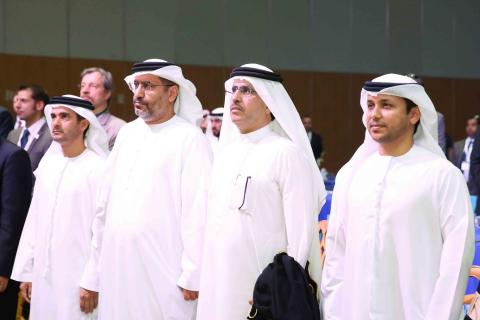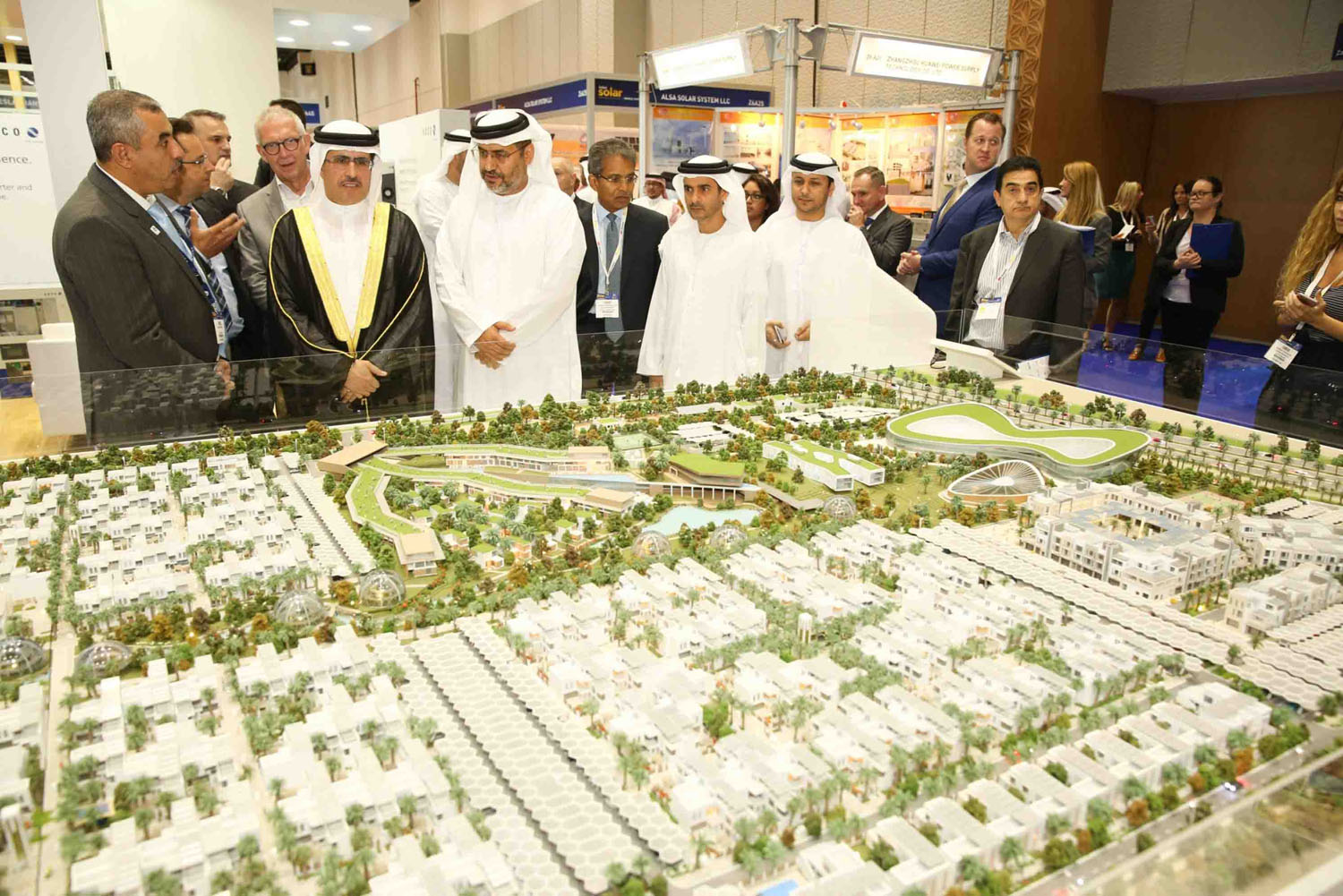
HE Saeed Mohammed Al Tayer, MD & CEO of Dubai Electricity and Water Authority (DEWA) inaugurated today the second Global Solar Leader’s Summit, which took place at Dubai World Trade Centre on 19 September 2016. The Summit highlighted the latest techniques in solar energy, and was attended by HE Dr Matar Al Neyadi, Undersecretary of the UAE Ministry of Energy, Waleed Salman, Executive Vice President of Strategy & Business Development at DEWA, Marwan Bin Haider, Executive Vice President of Innovation and the Future at DEWA, Khawla Al Mehairi, Vice President of Marketing and Corporate Communications at DEWA, and 300 leaders and decision makers in renewable energy from around the world.
In his opening speech, Al Tayer welcomed the summit’s guests and highlighted DEWA’s efforts to diversify its energy resources over the past four years, the Shams Dubai initiative, and efforts to transform the Emirate into an international hub for clean energy.
“Dubai hosting this summit is very significant, as the UAE, and especially Dubai, is already leading the way in its efforts to transform into a green knowledge-based economy, while diversifying the structure of our economy to achieve sustainable development based on knowledge, innovation, and sustainable green growth. This is achieved by launching initiatives in renewable energy, solar power, and smart grids, while establishing long-term strategies to increase the percentage of clean energy in the energy mix, limit carbon emissions, and reduce the carbon footprint of the Emirate. Dubai has made real progress with this over the last few years, as a major factor to contribute to the use of solar power regionally and internationally,” said Al Tayer.
“Dubai’s energy sector is developing in accordance with the vision of HH Sheikh Mohammed bin Rashid Al Maktoum, Vice President and Prime Minister of the UAE and Ruler of Dubai. This supports the UAE Vision 2021, and the Dubai Plan 2021, to make Dubai a smart, integrated, and connected city that is sustainable with its resources, while improving living standards to meet the future ambitions of the Emirate,” added Al Tayer.
“HH Sheikh Mohammed bin Rashid Al Maktoum launched the Dubai Clean Energy Strategy 2050 to make Dubai a global centre of clean energy and green economy. The strategy aims to provide 7% of Dubai’s energy from clean sources by 2020, 25% by 2030, and 75% by 2050, to eventually transform Dubai into the city with the lowest carbon footprint in the world by 2050. HH Sheikh Mohammed bin Rashid Al Maktoum launched the strategy to coincide with the inauguration of the second phase of the Mohammed bin Rashid Al Maktoum solar park, which is the largest single-site solar park in the world, with a planned capacity of 5,000 megawatts (MW) by 2030, and a total investment of USD $13.6 billion (AED 50 billion), saving approximately 6.5 million tonnes per annum in carbon dioxide emissions. Dubai aims to create an environmentally-friendly energy mix with 25% of our energy coming from solar power by 2030,” said Al Tayer.
“The Mohammed bin Rashid Al Maktoum solar park has attracted a huge amount of interest from the business and energy sectors. DEWA has received several offers from international solar energy companies. This has been encouraged by favourable current regulations and legislation in Dubai that permits private sector partnerships in power-production projects in the Emirate. DEWA has released a tender for leading international Concentrated Solar Power (CSP) consultancies to send their proposals for advisory services for the 200MW first project of the CSP plant. It will be operational by April 2021. DEWA will generate 1,000MW using this technology by 2030. This project will be launched at the Mohammed bin Rashid Al Maktoum solar park, in adherence with the directives of HH Sheikh Mohammed bin Rashid Al Maktoum,” added Al Tayer.
“At DEWA, we know that generating electricity all year round from the sun in Dubai requires that we adopt world-class practices and the latest international technologies. This supports DEWA’s role in achieving its objectives for sustainable development, while preserving natural resources and protecting the environment from pollution, to ensure a brighter future for generations to come. DEWA also supports the Smart Dubai initiative, launched by HH Sheikh Mohammed bin Rashid Al Maktoum, to make Dubai the smartest and the happiest city in the world. This is why DEWA launched the Shams Dubai initiative to install solar panels in houses and buildings and connect them to DEWA’s grid. This encourages building owners to install photovoltaic panels on rooftops to generate solar power. DEWA has currently completed several projects as part of the Shams Dubai initiative, including one of the largest single-rooftop photovoltaic arrays in the Middle East and North Africa, a 1.5 megawatt direct current generation project at Jebel Ali Power Station and successfully connected it to DEWA’s grid. DEWA also launched the Smart Applications and Meters initiative, to speed up connections, respond faster, and save energy. The Green Charger initiative establishes the infrastructure for electric vehicle charging stations. To date, DEWA has established 100 charging stations across Dubai to promote the uptake of electric vehicles,” added Al Tayer.
“In addition to DEWA’s efforts to increase its dependence on renewable energy sources, DEWA is also committed to raising awareness about energy conservation. This supports our efforts to achieve the Dubai Integrated Energy Strategy 2030 to reduce energy demand by 30% by 2030. This is part of our continuous efforts to enhance sustainability and support the process of sustainable development in the Emirate.”
“Dubai’s achievements over the past few years stand as international accomplishments that meet the highest standards. Dubai is committed to establishing a sustainable model in energy conservation which can be exported to the whole world, and support economic growth without damaging the environment and natural resources,” concluded Al Tayer.
Categories
- Log in to post comments

